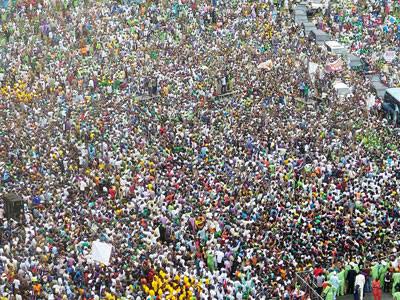Political rallies, citizen engagement and the 2023 elections
By Femi Olugbile
Nigeria is in the season of elections. It is a particularly fraught time for the citizens, and those aspiring to lead them. There is a quickening of the pace of political activities. The excitement in the air is building up to fever pitch.
The advent and widespread adoption of social media in Nigeria has added an extra dimension to citizen engagement. WhatsApp and Instagram have become new battlegrounds. The ‘big boys’, over the past few months, have recruited armies of netizens to be part of the invisible engine of their determined efforts to woo the public.
In 2023, more than ever before in Nigeria, election is not about the party, but the person. Political parties, after a faint play at ideological self-definition that was mostly confined to the First and Second Republics, have become, for the most part, mere vehicles for achieving the ambitions of powerful and politicians. As illustration, in the current dispensation, the most easily recognisable ‘progressives’ are in the APC, riding a party-vehicle characterised by a hide-bound, atavistic neo-feudal bent. The PDP is a joke in ‘social consciousness’ terms, having never made any pretensions to ideology except what is described at the street level as ‘share the money’. The Labour Party has a name that suggests it as a representative of ‘blue collar’ working people, with automatic affiliation with Labour Unions, and a left-wing thrust like the Labour Party of Aneurin Bevan that created the NHS in the UK as an eternal expression of its commitment to the welfare of the masses. In Nigeria the party is a vehicle for a candidate who up till his ‘adoption’, or ‘take over’, had never shown any pro-labour leaning, and was anything but a fist-waving, air-punching ‘a luta’ activist.
The challenge of lack of ideology has been flipped into opportunity. In the United Kingdom, it would be inconceivable for a politician to hop from Labour to Conservative, and a few months later, hop back to Labour, and contest for a seat in Parliament. Here, such ‘bed-hopping’ is the fare of everyday life. It sometimes leads to absurdities when the proclaimed social values of a candidate are cross matched with the identity of his political party.
To paraphrase the words of an old Country song by Johnny Cash:
‘…the one on the Right is on the Left
The one in the middle is on the Right
And the one on the Left is in the middle…’
How do Nigerians decide who to vote for? Do people vote with their brains, or their guts? Indeed, at a pragmatic, managerial stock-taking, is the hugely expensive criss-crossing of the nation and the holding of humongous rallies where people come to sing and dance and shout and collect campaign memorabilia, and occasional ‘mobilisation’, value for money? Is the political rally a battle for new minds, or a show of force, an exercise in preaching to the already converted?
A look at the psychology of the Nigerian political rally shows it is carried out to ‘shock and awe’ the opposition and to provide a visual demonstration of the popular appeal of the party to the world. It is not an efficient avenue for recruiting fresh converts to the cause. At the rally, the candidate and his handlers struggle through a thick press of humanity, with sweating gun-wielding security men clearing a path to the podium. Sometimes they fire in the air to keep back the surging crowd who want to touch the candidate or shake his hands.
Speech, when it comes to time for it, is short, and is generally full of cliches and party slogans. Music is provided by popular or less known youthful twangers and crooners, such as the Port Harcourt upstart who has become famous for the lines:
‘As e dey pain them
E dey sweet us….
For the uber-mighty, there are billionaire old warriors such as K1, making up catchy, timeless rhythm as they go along.
The crowd is lucky if the candidate gets to speak for five minutes.
All too soon, the rally is over.
The sweating security men begin again to clear a path through the human press from the podium to the motorcade, or to the helicopter.
What ideas can be marketed in such a melee?
The real battleground is in the mainstream and social media. More than ever before, fake news and disinformation are deployed as deliberate weapons of offence and defence Everyone is involved, despite their protestations of innocence.
It is unconscionable that Nigerians are approaching these crucial elections in an atmosphere of unprecedented distress and distemper. They are buffeted by lack of petrol and struggling vainly to get access to their money mopped up by the banks. They struggle daily to feed themselves and their children. Markets are in disarray as desperate people resort to an ante-diluvian trade by barter. The sour mood of the populace is totally out of tune with the chest-beating words out of Abuja about how The Leader has ‘done his best’.
A lot of citizens’ hopes are riding on the ‘change’ to come from the 2023 elections. Will they herald a Restructuring of their polity and governance, and even their personal values? Will they precipitate an honest re-examination of the nations’ fault lines? Will the federating peoples sit down together to reach agreement on the National Question and how to proceed with the Union? Or will there be a determined effort to continue with familiar platitudes and ‘business as usual’ self-deception that have brought the country to this sad pass?
Human Angle wishes Nigerians a happy, trouble-free elections 2023 that will help move their ailing country forwards. It is the least the long-suffering people deserve.

